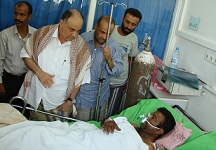There is no weapon of mass destruction worse than poverty. Tragically, for some Egyptians, selling a kidney is the only way out, destroying not only their bodies, but also their souls.
Prey to an elaborate underground network of body-part brokers, Egyptians with few options have become a statistic, prompting the World Health Organization to identify Egypt as one of six countries considered to be organ-trafficking hotspots.
Horror stories regularly published in the local press, tell of cases where people have been duped into selling their kidneys for as little as $2,000 and left to wither away with no after-surgery care and no recourse to legal action, especially in the absence of a law regulating organ transplants.
A draft law that has been in the pipeline for years, has however, been the subject of heated public debate and is currently under examination in parliament. It aims to prohibit transplants to foreigners, restrict operations to public hospitals and impose sentences of up to 15 years in prison and $180,000 fines for violations.
Apart from the shocking fact that in 2009 legislators in Egypt are still unable to reach consensus over such a vital issue, the very nature of the ongoing debate is evidence that a scientific approach to bioethical questions is almost entirely non-existent.
Adding to the general chaos, religious voices too are divided.
Despite the fact that PA Speaker Fathi Sorour has rightly relegated the matter to the health committee, the Grand Shiekh of Al-Azhar has taken matters into his own hands.
Sheikh Mohamed Sayed Tantawy pitched in with two opinions that fall completely outside his area of expertise.
First, he single-handedly resolved the bone of contention regarding the definition of death by publicly saying that brain death constitutes legal death, hence allowing organs to be taken from such cases; and second, he proposed the use of the organs of death row criminals in transplant operations without their prior consent.
Even if one were to agree with him, it is not Sheikh Tantawy’s place to make such proposals.
On the other hand Dar Al-Ifta, the only religious institution in Egypt tasked with announcing fatwas, headed by Sheikh Ali Gomaa, has reasonably concurred with Sorour, saying that the PA’s religious affairs committee should be excluded from the debate’s initial stages.
The Mufti’s spokesman told this newspaper that only after the draft law is presented in its entirety to the PA and the medical debate regarding the definition of death is settled, should the law be referred to the religious affairs committee and other religious authorities.
“The religious debate stems from the medical debate and not vice versa, he said.
I completely agree, but still, even if Egyptian scientists never reach consensus in this sensitive bioethical question, it should not hinder the issuance this law and the outlining of a full-proof system to regulate organ transplants that will continue happening whether some Sheikhs or some doctors like it or not.
In the US, for instance, donor organs are matched to waiting recipients by a national computer registry, called the National Organ Procurement and Transplantation Network (OPTN).
This registry is operated by an organization called the United Network for Organ Sharing which coordinates with 58 organ procurement organizations across the country and provides organ procurement services to some 261 transplant centers. All hospitals are required by law to have a “Required Referral system in place. Under this system, the hospital must notify the local Organ Procurement Organization (OPO) of all patient deaths.
If the organization determines that organ and/or tissue donation is appropriate in a particular case, they will have a representative contact the deceased patient’s family to offer them the option of donating their deceased family member’s organs and tissues.
There is also a Uniform Donor Card system whereby individuals indicate in writing, their wish to be donors. However, at the time of death, the person’s next-of-kin will still be asked to sign a consent form for donation.
So ultimately, it’s about choice: that of the deceased donor and that of his family. The question of whether or not a person is actually dead, must also be agreed upon between the family and the doctors on a case by case basis.
It is also about giving patients who need these organs a choice. Those who refuse to exploit the destitution of others less fortunate than themselves should not be rewarded by being left to perish because a handful of their so-called representatives can’t make up their mind on an issue the whole world had decided on decades ago.
These are the details our venerable MPs need to be working out, instead of wasting their breath on endless philosophical and religious debates that will never be resolved so long as new scientific discoveries about the mysteries of life and death are being made.
The objective of law and religion is to preserve the dignity of human beings, not to perpetuate dogmatic ideologies, whether cultural or religious. Clearly the absence of a closely monitored organ transplant system and legislation has served only to dehumanize poor Egyptians whose despair has pushed them to cut such unconscionable deals with the devil.
Rania Al Malkyis the Chief Editor of Daily News Egypt.


